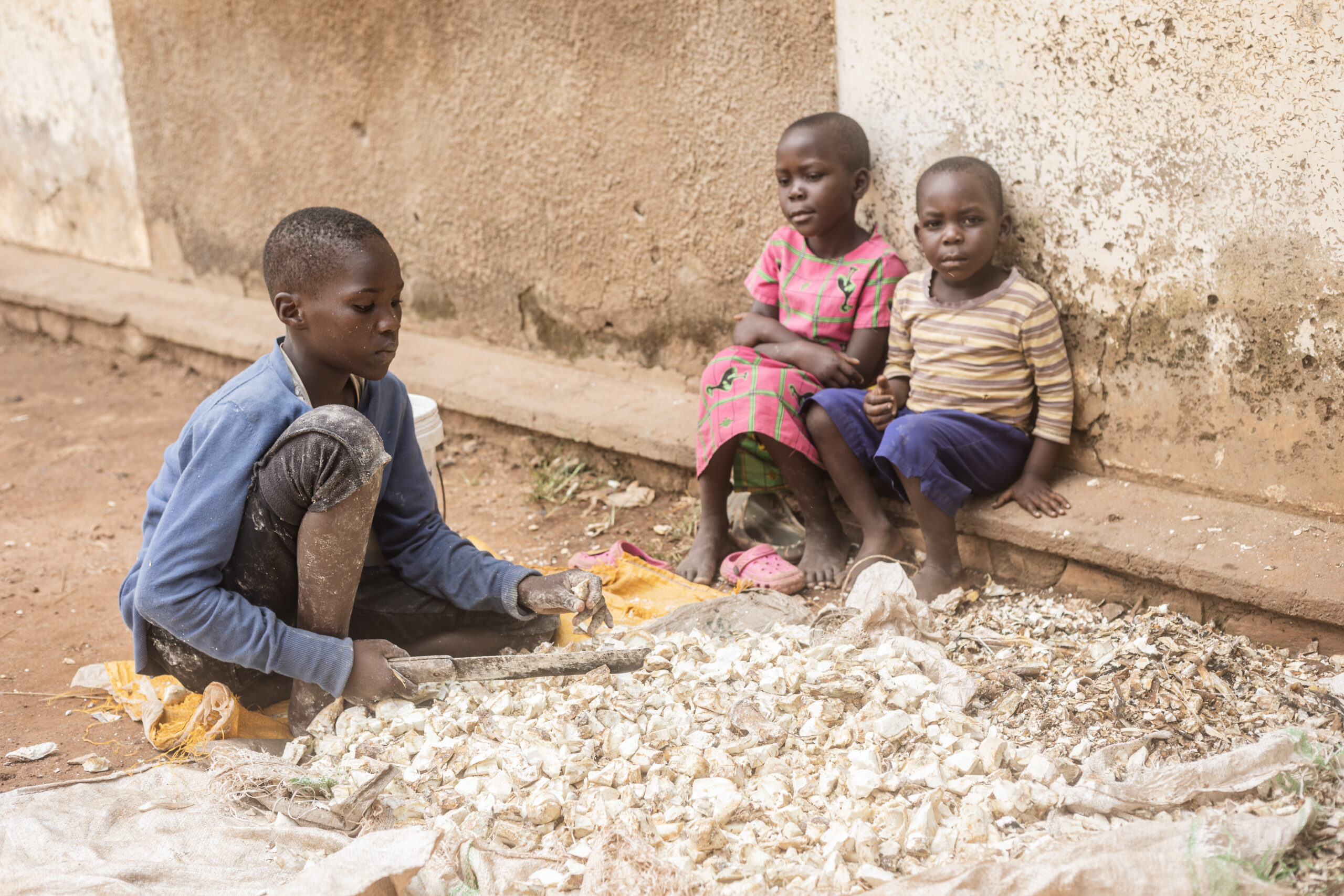Kampala city and the neighboring communities have fashioned a flouring night business on the streets. Night street markets are common in urban rural residential communities and neighboring such as Kamokya, Bwaise, Wandegeya, Ntinda, Nansana, Bweyogere, and Kireka among others.
Traders parade cheap merchandise of disparate kinds; cooked food such as yams, potatoes, Katogo (a famous food made of matooke and other foods) cassava, chips, chapatis and Rolexes among other exciting items; raw foods and fruits, clothes and shoes, kitchen ware and many other items. With Uganda’s highest low-income earners, street markets are a huge attraction. Families that are in the kind of business would require a gigantic task force to make the most out the night. Children become the most reliable source of labour in this instance.
The tactic used here is effective, children always win sympathy from their older counterparts so they present themselves as better selling agents. Some have even learned to convivence their buyers to support by wooing them with explanations such as “please buy from me I need to buy my books for school”, “please support me to raise school fees and while other are desperate and tired they mention that “I cannot go back home until I have sold off all the goods”. However much the intention, children working in the late hours of the night is violation of their rights but also exposes them to uncertain dangers especially the girl child.
It is uncommon for parents to think that children helping out with the family business would be unlawful. They would actually think that they are training the child to become hard working. They do not in any case cause consider the dangers in such work since most of those are along term condition.
This work is by nature and circumstances in which it is performed is likely to harm the health and safety of children. Children working the streets for as late as 10 pm exceeds the constitutional time allocated for children over 15 years of age to work. Uganda’s labour laws allow children aged 15 to 18 who may not be in school to work for not more than 7 hours a day and not to hours passed 07:00 pm.
But in this case children as young as 6 years of age roam the streets with baskets heavy on their heads or hands full of merchandise while crossing from one street to another till late. Considering the high cases of teenage pregnancies, child sexual abuse, child trafficking and kidnap, children working on the streets and in the night at a very high risk of being affected.
Children from infancy up to the age of 18 benefit from our services. We are currently serving children in Central and Western Uganda, in both urban and rural areas. An encounter with a young girl vending avocado fruit in an unsupervised and poorly parking lot at 08:00 pm in Wandegeya on evening appalling for me but she seem nescient about the dangers that come her was in such a situation. In our chic chat as she tried to sell me her avocado, she introduced herself Naki- short form for Nakiwala. Considering her looks, she was of about 11 years but very vibrant and determined to make a sell but not strong enough to fight off an atrocious attack. Naki, explained lives in Kivulu slum and her mother has a small stall in the community, in the evening, Naki and her siblings would carry items from the stall to streets so that they can reach as many buyers as possible. When I asked her where her siblings were, she shyly said she did not know at the moment but they will all return home after selling what they had.
While the children are selling, their mother is home making dinner, with a hope that her children will come back safe and in time for dinner. How ironical! In a dark parking lot, at 08:00 pm, anything would have happened to this poor girl and the perpetrators may never be found. Naki and her siblings and many other children would usually would leave the streets at about 9:00pm.
First of all, children have “laboured” all day at school are tired by the time they walk back home in the evening. They also come in with loads of home work which is never attended to by the pupil or the parents and the misery question is when do they do it. They are then loaded off with goods to carry out another hectic responsibility before breaking off to rest. Most of these children are working to achieve obligations and responsibilities of their care takers and parents such as providing, meals for the family, buying basic care needs, buying books and paying school fees.
Children, are not attended to or supervised by an adult as vendor products this late in the night. This therefore exposes children to numerous dangers while of these streets in the night. Children lives are endangered in ways that they may be involved in traffic accidents, defiled, sexually harassed and abused, kidnaped, injured and experience excessive temperatures such the cold, noisy streets not allowing children rest in mind, long and late working hours. Eventually this may lead to mental breakdown, emotional and psychological stress that usually leads them to drug addictions, poor attendance and performance in school and some may escape from home to live on the streets, a life they may consider stress free.
The practice is almost socially acceptable with some social actors cautioning it but not taking concrete actions to end child labour. Yes, children are allowed to do a bit of little work but with guidance and supervision of an adult and that this work is executed in environments and circumstances that may not harm or affect the child in any way. The night street vending however presents just the opposite.
Child labour demines fundamental human rights, children’s rights such a right to education, right to rest and leisure and freedom from the countries unfair working conditions such as rights to imperative living standards of children.
Many players ensuring none violation of children’s rights have not acted or brought this practice to table or even devised means to eradicate this vice. Social actors such as the Police, (child and family protection), NGOs, teachers, media, religious leaders and faith-based institutions, policy makers, children rights activists, government officers and child protection officers among others have a fundamental role to play in ending child labour and its harmful practices. Education and second chance learning
To end child labour in our communities, social actors should consider expansion of social protection and implementation of child labour laws, by establishment child labour inspection and monitoring, consider great public sensitization and awareness of violation of children’s rights and dangers of child labour, promote social mobilization against child labour among the public and advocate for political commitment to stand against child labour.





